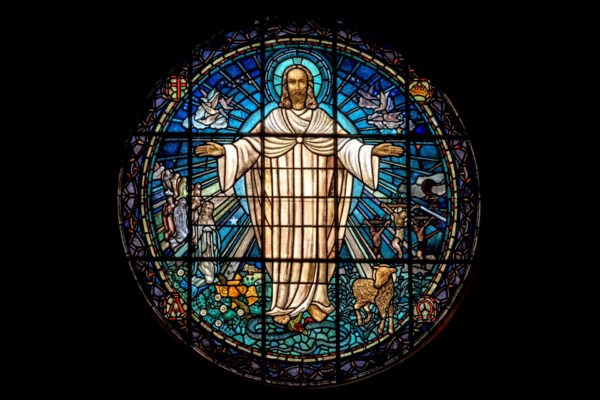The phrase “Spirit-filled” is tossed around a lot today in evangelicalism. Most often, this label is used to describe a Christian or a church that emphasizes spiritual gifts, experiences authentic and emotional worship ‘encounters,’ and seeks to avoid “putting God in a box” when it comes to the expression of faith.
However, the phrase “Spirit-filled Christian” or “Spirit-filled church” is actually quite misleading (and often used in a divisive way, suggesting that someone or some church isn’t Spirit-filled). It’s like using the phrase “born-again Christian.” How are these phrases misleading? Because every true Christian is born again; there’s no such thing as a Christian who is not born again. Similarly, every true Christian has received the Holy Spirit, and thus every true Christian church is Spirit-filled! The church of Jesus Christ is the assembly of those called by God the Father into the fellowship of his Son by his Spirit (1 Cor. 1:9; 3:16-17; 12:13; Eph. 2:18-22).
Now of course, there are all kinds of ‘churches’ in all kinds of ‘Christian’ denominations today that are not true churches of the Lord Jesus Christ and therefore not Spirit-filled. However, the true church of Christ is the Spirit-filled, indwelt, baptized, empowered, illuminated, sanctified, and sealed assembly of the restored people of God under the saving rule of the risen Lord Jesus.
But, what does a true “Spirit-filled” church look like? There is no better place to answer this question than to look at the results of when the Holy Spirit was poured out upon the new covenant church in fullness on the day of Pentecost.
The Restored People of God
In Acts 2:41, we read that those who received Peter’s word—who believed the gospel of the risen Lord Jesus—were baptized and were added to the church. Some 3,000 Jews in Jerusalem received the forgiveness of sins through Christ’s atoning death. They received the promised gift of the Holy Spirit from the ascended Christ. And then immediately, we are given a comprehensive portrait of the life of the early church.
In fact, the description of the church in Acts 2:42-47 is one of the clearest proofs that the Spirit of Jesus had indeed been poured out upon the restored people of God. This passage reveals that a true, “Spirit-filled” church will be one that is joyfully devoted to doctrine, to fellowship, and to prayer. Those who, by grace through faith, receive the gift salvation and the very Spirit of Jesus (i.e., Christians) are those who obey the word of their King, who love the people of their King, and who rely on the power of their King.
But before we look at each of these areas in more detail, notice the way Luke describes how they did all these activities: they devoted themselves. They continued steadfastly, passionately; they were persistently committed to the Christian faith. If Luke is painting a portrait of the church, he is painting with the boldest and most vibrant of colors. The life of the church was one of radical devotion to their risen Lord. These Christians began to live as though Jesus really was the king of the world, all because they had received the Holy Spirit.
A Spirit-Filled Church is Joyfully Devoted to Doctrine
And they devoted themselves to the apostles’ teaching (Acts 2:42).
The first thing Luke mentions is the church’s radical commitment to the teaching—the doctrine or message—of the apostles. And what was this teaching? It was what Peter had just preached in Acts 2: the gospel of the risen Lord Jesus. Their message was the good news of the kingdom of God under the saving rule of Christ! They taught that the God-man, Jesus of Nazareth, was the fulfillment of all of God’s covenant promises. He is the second Adam, the prophet like Moses, the Passover Lamb, the true Israel, the perfect redeemer, the greater Son of David. This Jesus offered up his own life as an atoning sacrifice for the sins of all who would believe in him and was raised from the dead by the glory of the Father for our justification.
Their doctrine included everything revealed in the Old Testament, everything spoken by Jesus during his earthly ministry, and the significance of his death and resurrection—all of which they would go on to explain in letters and sermons in what has become the New Testament. And the church was radically devoted to this gospel, the word of God. They not only heard it and studied it but proclaimed it and bore witness to Jesus in the power of the Spirit.
“With Signs and Wonders Confirming”
How did the people in Jerusalem know that the doctrine of the apostles was the truth? Luke tells us in verse 43: “Awe came upon every soul, and many wonders and signs were being done through the apostles.” Just as God performed miracles through Jesus to validate his identity as the Son of God (Acts 2:22), the teaching of the apostles was also confirmed by signs and wonders! Jesus empowered his official representatives to lay the foundation of the church as the new leaders of the restored people of God.
But the church wasn’t devoted to these signs and wonders; they were devoted to doctrine! This is not to say that the early church didn’t believe God for miracles (as we’ll see in just a moment), but they weren’t seeking to perform signs; their focus was on the Person to which the signs of the apostles were pointing: King Jesus (cf. 1 Cor 1:18-25)! Throughout the book of Acts, it is repeatedly stated that miracles, signs, and wonders were performed by the apostles and their associates. Why? Because the apostles were chosen and entrusted by the risen Lord Jesus to lay the foundation of the church; it was their word about Jesus that was to be received and believed (2:41). Thus we read that “all who believed were together” (2:44).
Centered on the Word of the Risen Lord Jesus
Today, the doctrine of the apostles is found in what we know as the New Testament, along with the revelation of God that is the Old Testament. Being joyfully devoted to doctrine means being joyfully devoted to Scripture—hearing, believing, obeying, and continuing steadfastly in the Bible! Simply put, a Spirit-filled church is centered on the Word of the risen Lord Jesus. The Holy Spirit is the Spirit of truth who guides the people of God into all truth (John 16:13). He bears witness about Jesus (15:25). We are sanctified in the truth, and God’s Word is truth (17:17). So, to receive the gift of the Spirit is to receive a passionate desire to be centered on the Word.
God’s Word is the instrument of our salvation: It is how we come to faith in Christ (Rom. 10:17); it is how we are born again (1 Pet. 1:23). But God’s Word is also sufficient for our sanctification: It is how we are trained in righteousness and grow in godliness, becoming complete and equipped for every good work (2 Tim. 3:16-17). We need gospel doctrine! A true church is a community of believers where God’s Word is loved, read, studied, and obeyed in its entirety. Bobby Jamieson writes: “Sound doctrine is the lifeblood of the church. It shapes and guides the church’s teaching. It nourishes holiness. It fosters love. It grounds and repairs unity. It calls forth worship. And it informs and motivates our witness to the gospel” (Sound Doctrine, 107).
So, for those who claim to be “Spirit-filled”: Are you devoted to doctrine? Do you consume God’s Word? Do you meditate upon it day and night, rehearsing the gospel to yourselves daily? Do you teach this doctrine to your children? Do you believe and obey it? Is your entire life centered on and nourished by the Word of Christ?
However, being devoted to doctrine does not stop at centering our lives on God’s Word. No, being devoted to the teaching of the apostles leads to transformation; doctrine leads to devotion.
A Spirit-Filled Church is Joyfully Devoted to Fellowship
And they devoted themselves to . . . the fellowship, to the breaking of bread (Acts 2:42).
There’s not just a body of doctrine that must be believed and obeyed; there is a body of believers that must be loved and encouraged. Sound doctrine teaches us that not only have we been saved from the King’s judgment, but that we have been saved to his kingdom and his people.
The word ‘fellowship’ is a beautiful and significant word that, all too often, gets thrown about carelessly. When we hear ‘fellowship,’ we usually think handshakes, hellos, and howdy-dos; we think fellowship halls, church lobbies, and potlucks; we think socializing and mingling. But this is not what Luke is describing. This is the Greek word koinonia, and it means “a close association involving mutual interests and sharing.” It’s translated as fellowship, communion, participation. (Outside the New Testament, it was used to express the marriage relationship.)
This is the word used to describe our union with Christ by faith! Listen to the Apostle Paul in 1 Corinthians 1:9: “God is faithful, by whom you were called into the fellowship of his Son, Jesus Christ our Lord.” Paul later explains that this fellowship with Christ is from the Holy Spirit we have all received (2 Cor. 13:14; Php. 2:1) John writes that “our fellowship is with the Father and with his Son Jesus Christ” (1 John 1:3). Because we have fellowship with God in Christ by the Spirit—because we have been united to Christ by faith and are now members of his body—we also have fellowship with one another in Christ by the Spirit. By the Spirit of adoption, we have become the new creation family of God!
Bearing Burdens in Love
And all who believed were together and had all things in common. And they were selling their possessions and belongings and distributing the proceeds to all, as any had need (Acts 2:44-45).
Describing the togetherness of the early church, Matthew Henry writes: “Wherever you saw one disciple, you would see more.” Their communion with Christ and one another completely changed their priorities. They were family. And their newfound devotion to fellowship was seen in two ways. First, being devoted to fellowship meant bearing burdens in love. Every member of the church held his possessions at the disposal of others. Their shared fellowship with Christ, and the forgiveness they had all received led them to share even their possessions with each other.
Verses 44-45 are often misunderstood. This doesn’t mean everyone got rid of everything they owned; rather, the believers were ready and willing to help those in need. If this meant sharing or selling their possessions, they would do so eagerly, joyfully, and generously. This also doesn’t mean the church didn’t care about unbelievers or those outside the church. Luke is showing us just how radically devoted the church was to the fellowship of the saints.
Breaking Bread with Joy
And day by day, attending the temple together and breaking bread in their homes, they received their food with glad and generous hearts, praising God and having favor with all the people (Acts 2:46-47).
Second, being devoted to fellowship also meant breaking bread with joy. Not only were the believers meeting together daily in the temple courts to hear the apostles teach and have fellowship with one another, they were also gathering often for meals with one another.
In v.42, Luke wrote that they devoted themselves “to the breaking of bread.” This phrase refers both to the ordinary meals the believers shared as well as the Lord’s Supper, which they would commemorate at their regular meals, remembering their Lord and his sacrifice. It was while breaking bread that the believers would begin to get to know one another, learn about their needs, yet also pray and worship their Lord and Savior together. Just as Jesus came eating and drinking, and revealed himself to his followers “in the breaking of the bread” (Luke 24:35), the early church celebrated gospel fellowship the same way.
The main force of this sentence is the statement at the end of verse 46: “They received their food with glad and generous hearts.” ‘Glad’ here literally means extremely joyful, full of exaltation; and ‘generous’ means simple—they ate with humble, honest, and sincere hearts. The church was characterized by a spirit of rejoicing and generosity. Even their meals were occasions for praising God with great joy, with hearts full of thanksgiving. This was the joy of salvation—a true sense of gratitude, contentment, and delight given by the Holy Spirit.
Transformed by the Love of the Risen Lord Jesus
The reason the early church was devoted to such deep, intimate fellowship was because they had received forgiveness of their sins and the fellowship of the Holy Spirit. This community wasn’t simply inspired by the love, forgiveness, patience, and generosity of the risen Lord Jesus; they had received the very Spirit and power of the risen Lord Jesus to actually walk in forgiveness, love, patience, and generosity!
In other words, a Spirit-filled church is transformed by the love of the risen Lord Jesus. Those who have had the love of God poured into their hearts by the promised Holy Spirit; those who have become new creations in Christ by the life-giving, regenerating power of the Spirit; those who have been called by grace into the fellowship of the blessed Trinity will be devoted to fellowship—both bearing burdens and breaking bread. John pulls no punches when he writes:
We know that we have passed out of death into life, because we love the brothers. Whoever does not love abides in death. . . . By this we know love, that he laid down his life for us, and we ought to lay down our lives for the brothers. But if anyone has the world’s goods and sees his brother in need, yet closes his heart against him, how does God’s love abide in him? Little children, let us not love in word or talk but in deed and in truth (1 John 3:14, 16-18).
This is profound: John is saying “Do you want to know if you are a believer? Do you want to know if you have been born again, saved from death and given new life? Then answer me this: Do you love the church? Are you devoted to fellowship?” Say all you want that you are a Christian, that you love Bible doctrine, that you give, that you shovel your neighbor’s driveway. But if you can go about your whole life, day to day, week to week, completely separated from and uninvolved in the life of the church, your failure to show love and concern for the believers testifies against you.
This is why membership in a local church is of the utmost importance for living the Christian life. Membership gives definition and direction to the commands given to Christians. How can you bear the burdens of every Christian? How can you pray for every Christian? How can you show hospitality to every Christian? You can’t. But by joining a local church, you have a defined community of believers with whom you can be devoted to fellowship in these ways.
But what explains the growth of the church? What explains the awe, the reverence, and the favor of the unbelievers towards the church? This brings us to the final aspect of our portrait…
A Spirit-Filled Church is Joyfully Devoted to Prayer
And they devoted themselves to . . . the prayers (Acts 2:42).
The church in Acts was a praying church. The rest of the New Testament shows that the church is to be a praying church (Eph. 6:18-19; 1 Thess. 5:17; 1 Tim. 2:1). And just like Jesus, who spent much of his ministry praying to his heavenly Father, the church will be devoted to prayer because it has received the Spirit of adoption by whom we cry, “Abba, Father!” (Rom. 8:15). These believers knew that in their own strength, they were helpless. They knew that on their own, they would fall into temptation and sin. They knew that if the world hated their King, it would surely hate them. But they also knew that they had been reconciled to God and brought into fellowship with him, and this fellowship was expressed in prayer.
The results? “And the Lord added to their number day by day those who were being saved” (Acts 2:47). What a powerful and beautiful and assuring truth! The church bore witness to the risen Lord Jesus in the power of the Spirt, prayerfully preaching the word of God, and God brought about the miracle of salvation (talk about doing greater things!). It is the risen Lord Jesus alone who builds his church, but he has graciously given us the opportunity to participate with him through prayer. And a church that truly depends upon God to change hearts of stone, to raise the dead to life, and to build up his church will pray. Salvation belongs to the Lord, and praise God he is still saving today!
We saw before that the early church wasn’t devoted to signs and wonders. Yet in one sense they were, because they were devoted to prayer. They knew that greatest miracle of all was the raising of a dead sinner to life by the resurrection power of God, and so they prayed. They knew that faith comes by hearing, and hearing through the word of Christ, and so they prayed for boldness (leaving the demonstration of the miraculous up to God). For example, in the face of persecution, they would later pray:
‘Grant to your servants to continue to speak your word with all boldness, while you stretch out your hand to heal, and signs and wonders are performed through the name of your holy servant Jesus.’ And when they had prayed, the place in which they were gathered together was shaken, and they were all filled with the Holy Spirit and continued to speak the word of God with boldness (Acts 4:29-31).
Dependent Upon the Power of the Risen Lord Jesus.
In a true “Spirit-filled” church, devotion to doctrine is central; we must aim to be centered fully on the word of God. In a true “Spirit-filled” church, devotion to fellowship is a nonnegotiable; we must seek to be transformed continually by the love of Jesus. But the church will only grow when the power of God is acknowledged, sought after, and depended upon in passionate prayer; we must be devoted to prayer.
You can substitute doctrine for entertainment and your church might see numerical growth. You can substitute online services for fellowship and your church might see a form of growth. But authentic numerical growth due to the salvation of sinners is the result of prayer.
Conclusion
Jesus of Nazareth was crucified on a cross, raised from the dead, and exalted to the right hand of God, not only to provide forgiveness of sins and the gift of his Spirit by faith in his name, but to create a people for himself— the Spirit-filled, new-creation, born-again, restored people of God. And the true Spirit-filled church is a church joyfully devoted to doctrine, to fellowship, and to prayer.
Does such devotion characterize you? Can you say that you are centered on the word of the risen Lord Jesus, seen in a devotion to doctrine? Have you been transformed by the love of the risen Lord Jesus, seen in a devotion to fellowship? Are you dependent upon the power of the risen Lord Jesus, seen in a devotion to prayer? To profess to believe in the risen Lord Jesus and yet fail to be devoted to the teaching of the apostles and the fellowship of the saints and to prayer shows that you may never have received the forgiveness of sins and the promised Holy Spirit. Only the gospel of the risen Lord Jesus will fuel such devotion.
So whatever else the phrase “Spirit-filled” may mean today, let this portrait of a true, Spirit-filled church be true of our local churches today. May we all live as though Jesus really is the King of the world.




